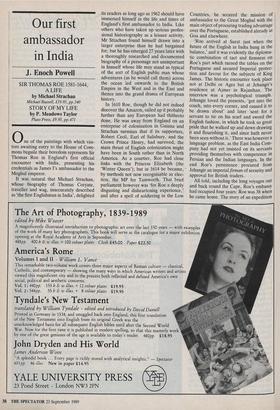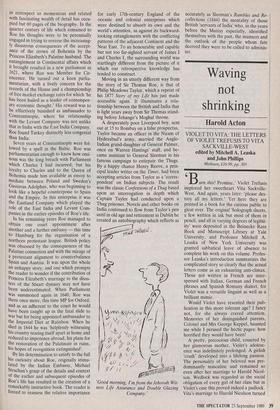Our first ambassador in India
J. Enoch Powell
SIR THOMAS ROE 1581-1644, A LIFE by Michael Strachan Michael Russell, £19.95, pp.340 STORY OF MY LIFE by P. Meadows Taylor Pluto Press, £9.95, pp.47I 0 ne of the paintings with which visi- tors awaiting entry to the House of Com- mons beguile their boredom represents Sir Thomas Roe in England's first official encounter with India, presenting his credentials as James I's ambassador to the Moghul emperor.
It was natural that Michael Strachan, whose biography of Thomas Coryate, traveller and wag, inaccurately described as 'the first Englishman in India', delighted its readers as long ago as 1962 should have immersed himself in the life and times of England's first ambassador to India. Like others who have taken up serious profes- sional historiography as a leisure activity, Mr Strachan found himself drawn into a larger enterprise than he had bargained for; but he has emerged 27 years later with a thoroughly researched and documented biography of a personage not unimportant in himself whose life may stand as typical of the sort of English public man whose adventures (as he would call them) across the ocean led onwards to the British Empire in the West and in the East and thence into the grand drama of European history.
In 1610 Roe, though he did not indeed discover the Amazon, sailed up it probably further than any European had thitherto done. He was away from England on an enterprise of colonisation in Guiana and Strachan surmises that if its supporters, Robert Cecil, Earl of Salisbury, and the Crown Prince Henry, had survived, the main thrust of English colonization might have been in South rather than in North America. As a courtier, Roe had close links with the Princess Elizabeth (the 'Winter Queen'); but in 1614 he became, by methods not now recognisable as elec- tion, the MP for Tamworth. That brief parliament however was 'for Roe a deeply disgusting and disheartening experience,' and after a spell of soldiering in the Low Countries, he secured the mission of ambassador to the Great Moghul with the main object of procuring trading advantage over the Portuguese, established already at Goa and elsewhere.
'Roe arrived at Surat just when the future of the English in India hung in the balance,' and it was evidently the diploma- tic combination of tact and firmness on Roe's part which turned the tables on the Portuguese and secured Imperial protec- tion and favour for the subjects of King James. The historic encounter took place not at Delhi or Agra but at Jehangir's residence at Ajmer in Rajasthan. The interview was a psychological triumph. Jehangir loved the presents, 'got into the coach, into every corner, and caused it to be drawn about' and later 'sent for a servant to tie on his scarf and sword the English fashion, in which he took so great pride that he walked up and down drawing it and flourishing it, and since hath never been seen without it.' There was however a language problem, as the East India Com- pany had not yet insisted on its servants providing themselves with competence in Persian and the Indian languages. In the end Roe's persistence procured from Jehangir an imperial firman of security and approval for British traders.
All told, including the long voyages out and back round the Cape, Roe's embassy had occupied four years: Roe was 38 when he came home. The story of an expedition
in. retrospect so momentous and related with fascinating wealth of detail has occu- pied but 60 pages of the biography. In the quarter century of life which remained to Roe his thoughts were to be perennially engaged in trying to reverse the increasing- ly disastrous consequences of the accept- ance of the crown of Bohemia by the Princess Elizabeth's Palatine husband. The entanglement in Continental affairs which it brought resulted in a new parliament in 1621, where Roe was Member for Cir- encester. He turned out a keen parlia- mentarian, with a lively concern for the records of the House and a championship of free market exchange rates for which 'he has been hailed as a leader of contempor- ary economic thought.' His reward was to be effectively banished as ambassador to Constantinople, where his relationship With the Levant Company was not unlike that in India with the East India Company. Roe found Turkey distinctly less congenial than India.
Seven years at Constantinople were fol- lowed by a spell in the Baltic. Roe was parliamentarian enough to know how omi- nous was the long breach with Parliament Which Charles I had incurred; but his loyalty to Charles and to the Queen of Bohemia made him available as envoy to mediate between Poland and Sweden's Gustavus Adolphus, who was beginning to look like a hopeful counterpoise to Spain and the Empire. In this enterprise it was the Eastland Company which played the role of the East India and Levant Com- panies in the earlier episodes of Roe's life.
In his remaining years Roe managed to Obtain one court appointment after another and a further embassy — this time to Hamburg for the organisation of a northern protestant league. British policy was obsessed by the consequences of the Palatine connection and with the mirage of a protestant alignment to counterbalance Spain and Austria. It was upon the whole an unhappy story, and one which prompts the reader to wonder if the contribution of Princess Elizabeth's marriage to the disas- ters of the Stuart dynasty may not have been underestimated. When Parliament was summoned again in 1640, Roe was there once more, this time MP for Oxford; and as an adherent to the court he would have been caught up in the fatal slide to war but for being appointed ambassador to the Imperial Diet at Ratisbon. When he died in 1644 he was 'helplessly witnessing his country tearing itself apart at home and reduced to impotence abroad, his plans for the restoration of the Palatinate in ruins, his hopes of recognition extinguished'. By his determination to satisfy to the full his curiosity about Roe, originally stimu- lated by the Indian Embassy, Michael Strachan's grasp of the details and context of the earlier and subsequent episodes of Roe's life has resulted in the creation of a remarkably instructive book. The reader is forced to reassess the relative importance for early 17th-century England of the oceanic and colonial enterprises which were destined to absorb its own and the world's attention, as against its backward- looking entanglements with the conflicting patterns of the adjacent Continent and the Near East. To an honourable and capable but not too far-sighted servant of James I and Charles I, the surrounding world was startlingly different from the picture of it which our retrospective knowledge has tended to construct.
Moving in an utterly different way from the story of Sir Thomas Roe, is that of Philip Meadows Taylor, which a reprint of his 1877 Story of my Life has just made accessible again. It illuminates a rela- tionship between the British and India that is light years away from Sir Thomas stand- ing before Jehangir's Moghul throne.
A desperately poor Liverpool boy, sent out at 15 to Bombay on a false prospectus, Taylor became an officer in the Nizam of Hyderabad's army, married the Anglo- Indian grand-daughter of General Palmer, once on Warren Hastings' staff, and be- came assistant to General Sleeman in his famous campaign to extirpate the Thugs. By a happy chance Henry Reeve, a prin- cipal leader writer on the Times, had been accepting articles from Taylor as a 'corres- pondent' on Indian subjects. The result was the classic Confessions of a Thug based upon an interrogation in depth which Captain Taylor had conducted upon a Thug prisoner. Novels and other books on India continued to flow from Taylor's pen until in old age and retirement in Dublin he created an autobiography which reflects as 'Good morning, I'm from the Jehovah Wit- ness Life Assurance and Double Glazing Company.' accurately as Sleeman's Rambles and Re- collections (1844) the mentality of those British 'servants of India' who, in the years before the Mutiny especially, identified themselves with the past, the manners and the outlook of the people whom fate decreed they were to be called to adminis- ter.



























































 Previous page
Previous page